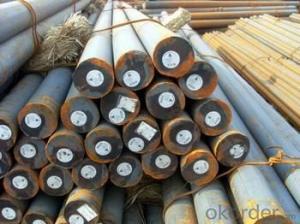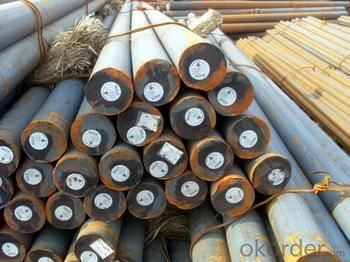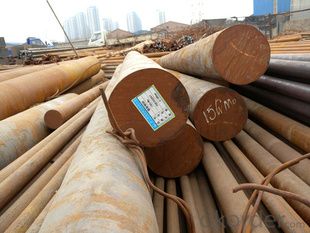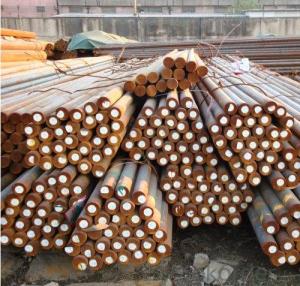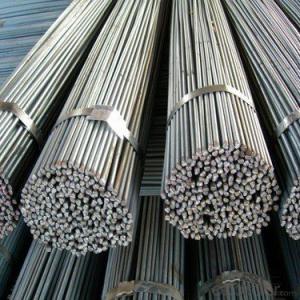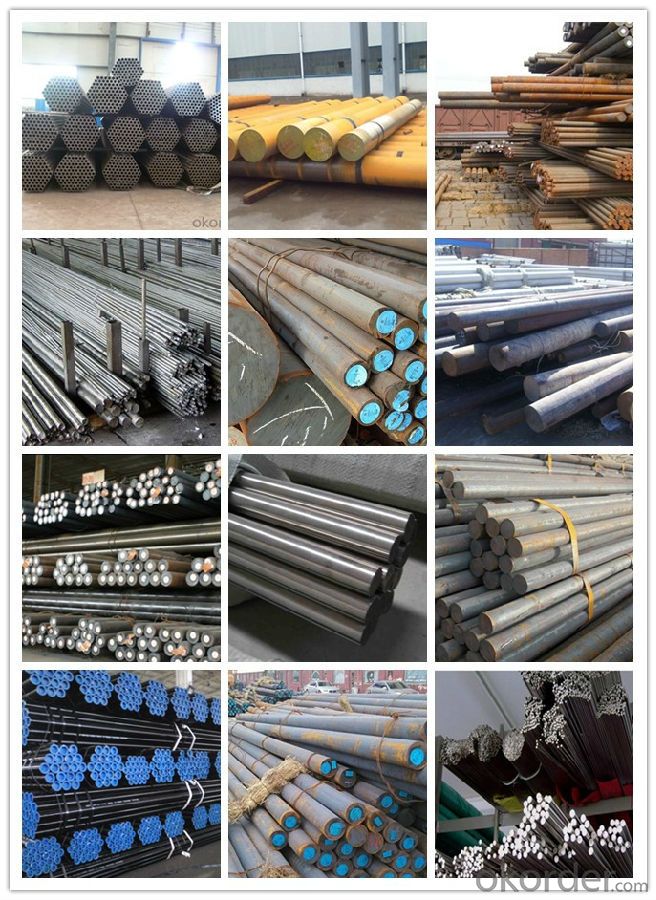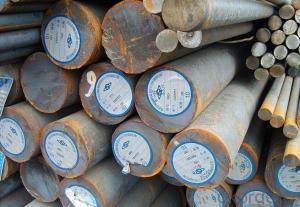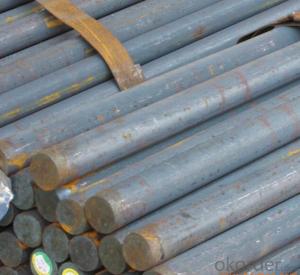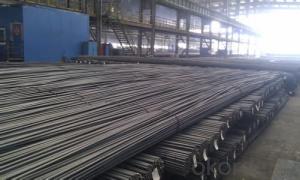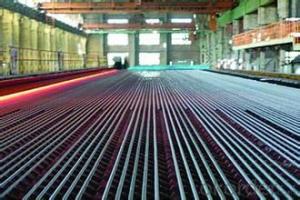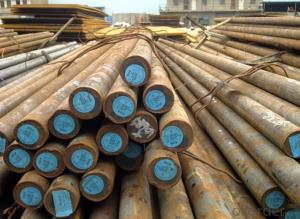Special Steel A36/A992 Round Solid Steel Bar
- Loading Port:
- China main port
- Payment Terms:
- TT OR LC
- Min Order Qty:
- 30 m.t.
- Supply Capability:
- 10000 m.t./month
OKorder Service Pledge
OKorder Financial Service
You Might Also Like
Specification
Features:
1) Material: Grade A, B, AH32, AH36, D, DH32, DH36, SS400, SS540, S235JR/JO/J2, S275JR/JO/J2, S355JR/JO/J2
With ABS, BV, CCS, DNV, GL, LR, NK, RINA and CE marks
2) Standard: GB, ASTM, JIS
3) Size: 23 X 23mm to 200 X 200mm
4) Length: As requested
5) Other dimensions or shapes are available
Alloy steel International Table:
Mark | China | USA | UK | Japan | France | Germany |
| structural alloy steel | GB | ASTM | BS | JIS | NF | DIN |
| 20Mn2 | 13201321 | 150M19 | SMn420 | 20Mn5 | ||
| 30Mn2 | 1330 | 150M28 | SMn433H | 32M5 | 30Mn5 | |
| 35Mn2 | 1335 | 150M36 | SMn438(H) | 35M5 | 36Mn5 | |
| 40Mn2 | 1340 | SMn443 | 40M5 | |||
| 45Mn2 | 1345 | SMn443 | 46Mn7 | |||
| 50Mn2 | ~55M5 | |||||
| 20MnV | 20MnV6 | |||||
| 35SiMn | En46 | 37MnSi5 | ||||
| 42SiMn | En46 | 46MnSi4 | ||||
| 40B | TS14B35 | |||||
| 45B | 50B46H | |||||
| 40MnB | 50B40 | |||||
| 45MnB | 50B44 | |||||
| 15Cr | 5115 | 523M15 | SCr415(H) | 12C3 | 15Cr3 | |
| 20Cr | 5120 | 527A19 | SCr420H | 18C3 | 20Cr4 | |
| 30Cr | 5130 | 530A30 | SCr430 | 28Cr4 | ||
| 35Cr | 5132 | 530A36 | SCr430(H) | 32C4 | 34Cr4 | |
| 40Cr | 5140 | 520M40 | SCr440 | 42C4 | 41Cr4 | |
| 45Cr | 51455147 | 534A99 | SCr445 | 45C4 | ||
| 38CrSi | ||||||
| 12CrMo | 620Cr.B | 12CD4 | 13CrMo44 | |||
| 15CrMo | A-387Cr . B | 1653 | STC42 | 12CD4 | 16CrMo44 | |
| STT42 | ||||||
| STB42 | ||||||
| 20CrMo | 41194118 | CDS12 | SCT42 | 18CD4 | 20CrMo44 | |
| CDS110 | STT42 | |||||
| STB42 | ||||||
| 25CrMo | 4125 | En20A | 25CD4 | 25CrMo4 | ||
| 30CrMo | 4130 | 1717COS110 | SCM420 | 30CD4 | ||
| 42CrMo | 4140 | 708A42 | 42CD4 | 42CrMo4 | ||
| 708M40 | ||||||
| 35CrMo | 4135 | 708A37 | SCM3 | 35CD4 | 34CrMo4 | |
| 12CrMoV | ||||||
| 12Cr1MoV | 13CrMoV42 | |||||
| 25Cr2Mo1VA | ||||||
| 20CrV | 6120 | 22CrV4 | ||||
| 40CrV | 6140 | 42CrV6 | ||||
| 50CrVA | 6150 | 735A30 | SUP10 | 50CV4 | 50CrV4 | |
| 15CrMn | ||||||
| 20CrMn | 5152 | 527A60 | SUP9 | |||
| 30CrMnSiA | ||||||
| 40CrNi | 3140H | 640M40 | SNC236 | 40NiCr6 | ||
| 20CrNi3A | 3316 | 20NC11 | 20NiCr14 | |||
| 30CrNi3A | 3325 | 653M31 | SNC631H | 28NiCr10 | ||
| 3330 | SNC631 | |||||
| 20MnMoB | 80B20 | |||||
| 38CrMoAlA | 905M39 | SACM645 | 40CAD6.12 | 41CrAlMo07 | ||
| 40CrNiMoA | 4340 | 871M40 | SNCM439 | 40NiCrMo22 |
Product show
Workshop show
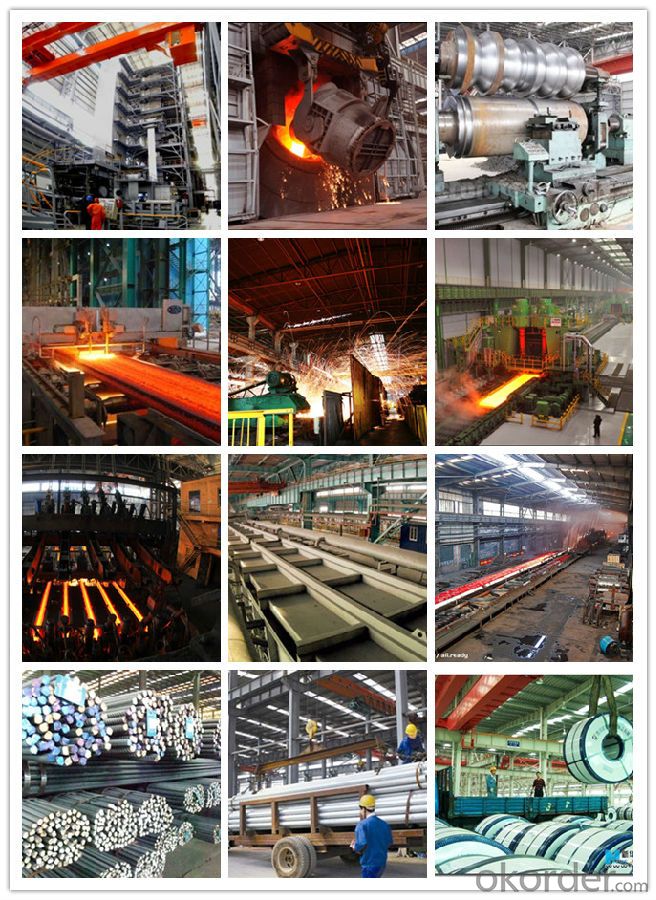
Shipping
1. FedEx/DHL/UPS/TNT for samples, Door-to-Door;
2. By Air or by Sea for batch goods, for FCL; Airport/ Port receiving;
3. Customers specifying freight forwarders or negotiable shipping methods!
Delivery Time: 3-7 days for samples; 5-25 days for batch goods.
Payment Terms
1.Payment: T/T, L/C, Western Union, MoneyGram,PayPal; 30% deposits; 70% balance before delivery.
2.MOQ: 1pcs
3.Warranty : 3 years
4.Package Informations: 1) EXPORT, In 20 feet (GW 25 ton) or 40 feet Container (GW 25 ton)
2)as customer's requirement
Why choose us?
(1) The leading exporter in China special steel industry.
(2) Large stocks for various sizes, fast delivery date.
(3) Good business relationship with China famous factories.
(4) More than 7 years steel exporting experience.
(5) Good after-sales service guarantee.
- Q: How does special steel perform in terms of corrosion resistance in marine environments?
- Special steel, also known as stainless steel, performs exceptionally well in terms of corrosion resistance in marine environments. The high levels of chromium and nickel present in the alloy composition of special steel make it highly resistant to corrosion caused by saltwater and other corrosive elements present in marine environments. The chromium content in special steel forms a protective oxide layer on its surface known as the passive layer. This passive layer acts as a shield, preventing the steel from coming into direct contact with corrosive elements. It effectively blocks oxygen and moisture from reaching the underlying steel, thereby inhibiting corrosion. Additionally, the presence of nickel in special steel enhances its corrosion resistance even further. Nickel improves the stability of the passive layer and increases its ability to self-repair if it gets damaged. This property makes special steel highly reliable and long-lasting in marine environments, where exposure to saltwater, high humidity, and varying temperatures can accelerate corrosion processes. Furthermore, special steel offers excellent resistance to pitting corrosion and crevice corrosion, which are common types of corrosion encountered in marine environments. Pitting corrosion occurs when localized areas of the steel's surface are attacked, resulting in small pits or holes. Crevice corrosion occurs in confined spaces such as gaps or joints, where stagnant water or debris can accumulate and accelerate corrosion. Special steel's resistance to these types of corrosion ensures its durability and integrity in marine applications. Overall, special steel demonstrates outstanding corrosion resistance in marine environments due to its high chromium and nickel content. Its ability to form a protective passive layer, resist pitting and crevice corrosion, and self-repair makes it a preferred choice for various marine applications, including shipbuilding, offshore structures, and seawater desalination plants.
- Q: Can special steel be used in the production of springs?
- Yes, special steel can be used in the production of springs. Special steel, such as alloy steel, is often preferred for manufacturing springs due to its high strength, durability, and resistance to deformation. It allows for the production of springs that can withstand heavy loads, maintain their shape over time, and provide reliable performance in various applications.
- Q: How does special steel perform in high-temperature creep?
- Special steel is specifically designed to perform well in high-temperature creep conditions. It possesses superior strength, resistance to deformation, and stability at elevated temperatures, making it highly suitable for applications where prolonged exposure to high temperatures and constant stress is expected. Its unique composition and heat treatment processes enable it to maintain its mechanical properties and resist deformation or failure for extended periods under these extreme conditions.
- Q: What are the main applications of special steel in the packaging industry?
- The main applications of special steel in the packaging industry include the manufacturing of containers, cans, and closures. Special steel offers excellent strength, durability, and corrosion resistance, making it suitable for packaging materials that need to withstand various environmental conditions and protect the contents inside. Its high tensile strength also allows for thinner and lighter packaging, reducing material usage and transportation costs. Additionally, special steel is used in machinery and equipment used for packaging processes, ensuring efficiency and reliability in the production line.
- Q: How does special steel comply with international standards?
- Special steel complies with international standards through a rigorous quality control process that involves testing the material for its chemical composition, mechanical properties, and dimensional accuracy. These standards, such as ISO, ASTM, and DIN, ensure that the steel meets the required specifications and performance criteria for various applications. Manufacturers also follow strict production guidelines and undergo regular audits to maintain compliance with these international standards.
- Q: How does special steel contribute to the automotive material recycling?
- Special steel contributes to automotive material recycling in several ways. Firstly, special steel is highly durable and resistant to corrosion, making it ideal for use in various automotive components such as engine parts, chassis, and body structures. This durability ensures that these components have a longer lifespan, reducing the frequency of replacement and consequently reducing waste generation. Additionally, special steel is highly recyclable, meaning that at the end of a vehicle's life cycle, the steel components can be easily and efficiently recycled. The recycling process involves melting down the steel and reusing it to create new steel products, thereby reducing the need for extracting and processing raw materials. Furthermore, the use of special steel in lightweighting initiatives, where lighter materials are used to reduce a vehicle's weight, contributes to fuel efficiency and lower emissions. This is significant for automotive material recycling as lighter vehicles require less energy to operate, resulting in reduced fuel consumption and environmental impact. Overall, the use of special steel in the automotive industry plays a crucial role in promoting sustainability through extended component lifespan, efficient recycling processes, and improved fuel efficiency.
- Q: How does special steel contribute to the mining machinery industry?
- The mining machinery industry relies heavily on special steel, which provides exceptional strength, durability, and resistance to wear and corrosion. This specific type of steel is engineered to withstand the harsh conditions typically encountered in mining operations. In the mining machinery industry, equipment such as drills, excavators, loaders, crushers, and conveyor systems face extreme stress, heavy loads, and abrasive materials. Various parts of these machines, including buckets, tracks, cutting edges, gears, and hydraulic components, incorporate special steel components. The high strength and toughness of special steel ensure that mining machinery can endure the immense forces and impacts involved in mineral excavation, hauling, and processing. This durability extends the lifespan of the equipment, reducing the need for frequent replacements and minimizing downtime, resulting in cost savings for mining companies. Special steel's resistance to wear and corrosion is crucial in the mining industry. The presence of abrasive materials and corrosive substances in the mining environment can cause rapid deterioration of machinery components. However, special steel alloys are designed to resist wear and corrosion, enhancing the longevity and performance of mining machinery. Additionally, special steel allows mining machinery to operate efficiently and effectively. Its high strength-to-weight ratio allows for the construction of lightweight yet robust equipment, improving mobility and productivity in mining operations. The use of special steel also enables the design of complex components with intricate shapes, ensuring optimal functionality and performance. Overall, special steel is an essential material in the mining machinery industry. Its exceptional strength, durability, resistance to wear and corrosion, and ability to enhance efficiency make it a vital component in the design and construction of mining equipment. By incorporating special steel, mining machinery can withstand the challenging conditions and heavy-duty tasks involved in mining operations, ultimately contributing to increased productivity, reduced costs, and improved safety in the industry.
- Q: How does special steel perform in corrosive environments?
- The purpose of special steel is to excel in corrosive environments. This is achieved by incorporating a greater amount of alloying elements, like chromium, which generates a safeguarding oxide layer on the steel's surface. By doing so, the steel is shielded from direct contact with the corrosive elements present in the environment. In addition, special steel may contain other alloying elements such as molybdenum, nickel, or copper, which further enhance its ability to resist corrosion. These elements contribute to the steel's capacity to withstand various types of corrosion, including pitting, crevice corrosion, and stress corrosion cracking, which are commonly observed in corrosive environments. Moreover, special steel often undergoes treatments with diverse surface coatings or finishes that offer additional defense against corrosion. These coatings encompass materials like zinc, epoxy, or polymers, which establish an extra barrier between the steel and the corrosive elements. To summarize, special steel delivers exceptional performance in corrosive environments due to its abundant alloying elements, protective oxide layer, and supplementary surface coatings. It provides remarkable resistance against different forms of corrosion and guarantees the durability and dependability of structures or equipment operating in such environments.
- Q: How does special steel contribute to the aerospace fastener industry?
- Special steel plays a crucial role in the aerospace fastener industry by providing high strength, durability, and resistance to extreme conditions. Aerospace fasteners are essential components that hold various parts of an aircraft together, ensuring structural integrity and safety during flight. The use of special steel in manufacturing these fasteners allows them to withstand the demanding requirements of the aerospace industry. One of the key contributions of special steel to the aerospace fastener industry is its ability to maintain strength at high temperatures. Aircraft engines operate at extremely high temperatures, and fasteners made from special steel can withstand these conditions without losing their integrity. This is essential for ensuring the reliability and safety of the aircraft, as any failure of the fasteners could lead to catastrophic consequences. In addition to temperature resistance, special steel also offers exceptional strength and corrosion resistance. Aerospace fasteners made from special steel can withstand the tremendous forces and stresses experienced during flight, ensuring that the components remain securely fastened together. Moreover, they are highly resistant to corrosion, which is crucial considering the exposure of aircraft to harsh environmental conditions, including moisture and chemicals. The unique properties of special steel also enable the production of lightweight fasteners without compromising their strength. Weight reduction is a primary concern in the aerospace industry as it directly impacts fuel efficiency and overall performance. By utilizing special steel, manufacturers can design fasteners that are both strong and lightweight, contributing to the overall weight reduction efforts of modern aircraft. Furthermore, special steel allows for the production of fasteners with precise dimensions and tight tolerances. This is essential for achieving a secure fit between components, minimizing vibrations and potential damage caused by movement during flight. The accuracy and reliability of special steel fasteners are crucial for maintaining the structural integrity and safety of the aircraft. In conclusion, special steel significantly contributes to the aerospace fastener industry by providing the necessary strength, durability, temperature resistance, and corrosion resistance needed for aircraft applications. Its unique properties enable the production of lightweight yet robust fasteners, ensuring the structural integrity and safety of modern aircraft. Without special steel, the aerospace industry would face significant challenges in meeting the demanding requirements of aviation.
- Q: What are the different additive manufacturing grades of special steel?
- Special steel for 3D printing processes comes in various grades, each tailored to provide enhanced mechanical properties, improved printability, and increased corrosion resistance. One popular grade is maraging steel, a low-carbon, high-nickel alloy known for its exceptional strength and toughness. It finds extensive use in industries like aerospace and defense, where high-strength components are required. Stainless steel is another commonly used grade in additive manufacturing. It is renowned for its corrosion resistance and ability to maintain strength even at high temperatures. This makes it suitable for applications in automotive, medical, and consumer goods sectors. Tool steel, with its remarkable hardness and wear resistance, is an essential grade for additive manufacturing. It proves ideal for cutting, shaping, and forming materials, making it a go-to choice for molds, dies, and tooling components. Inconel, a superalloy grade, stands out for its high-temperature strength and excellent oxidation resistance. It is widely utilized in the aerospace, automotive, and chemical processing industries. In summary, the various grades of special steel for additive manufacturing offer diverse properties and applications. Continuous development and improvement of these materials aim to meet the ever-growing demands of the industry.
Send your message to us
Special Steel A36/A992 Round Solid Steel Bar
- Loading Port:
- China main port
- Payment Terms:
- TT OR LC
- Min Order Qty:
- 30 m.t.
- Supply Capability:
- 10000 m.t./month
OKorder Service Pledge
OKorder Financial Service
Similar products
Hot products
Hot Searches
Related keywords
